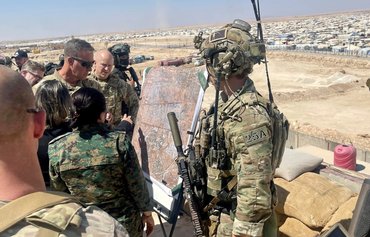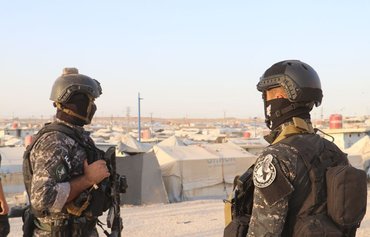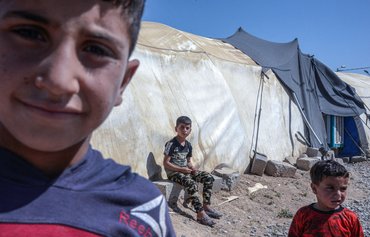Hundreds of Iraqi families repatriated from al-Hol camp in Syria's al-Hasakeh province are receiving psychological care and support in al-Jadaa camp near Mosul in Iraq's Ninawa province, as part of a rehabilitation programme.
After the families, largely comprised of women and children, have successfully completed the programme, they will be resettled in their communities of origin.
At al-Jadaa camp, the returnees are responding positively to a rehabilitation and community reintegration programme, Iraqi officials told Al-Mashareq, which has in turn encouraged the state to increase the pace of repatriations.
On June 3, 168 relatives of "Islamic State of Iraq and Syria" (ISIS) members were repatriated from al-Hol camp to al-Jadaa, an Iraqi official told AFP.
![Iraqi women repatriated from Syria's al-Hol camp take sewing lessons at al-Jadaa Rehabilitation Centre near Mosul on May 27, 2021. [Iraqi Ministry of Migration and Displacement]](/cnmi_di/images/2023/06/16/42621-al-hol-Iraqis-600_384.jpg)
Iraqi women repatriated from Syria's al-Hol camp take sewing lessons at al-Jadaa Rehabilitation Centre near Mosul on May 27, 2021. [Iraqi Ministry of Migration and Displacement]
They will be sent back to their home areas once tribal leaders in their home communities offer assurances that they will not face reprisals, he said.
The same day, 50 ISIS elements were repatriated from Syria, the official said.
They were detained in al-Hasakeh, according to the Syrian Observatory for Human Rights, and were handed over to Iraqi authorities by the Syrian Democratic Forces (SDF) to face investigations and justice.
On March 23, the fourth anniversary of the territorial defeat of ISIS in Iraq and Syria, the international coalition commended Iraq's government for the repatriation of nearly 5,000 of its nationals from al-Hol camp since 2021.
Iraqi National Security Adviser Qassem al-Araji on May 4 reiterated Iraq's commitment to repatriate, rehabilitate and integrate all Iraqis into society.
The Iraqi government will hold fast to this decision "out of its responsibility to protect all children and women victims", he said, adding that "members of those families who are wanted by security forces will go to court and stand trial".
Iraqi families in al-Hol
An estimated 7,000 Iraqi families remain in al-Hol, along with large numbers of ISIS family members from Syria and those from other countries who travelled to Syria to join their spouses.
Local authorities and international agencies have expressed well-founded fears that ISIS will spread extremist ideology in the camp, especially among vulnerable children, and create a new generation of terrorists.
Iraqi government committees and other partners are working to transport Iraqi citizens, including more than 20,000 children, out of al-Hol, and reintegrate them into Iraqi society under a comprehensive plan.
A 47-year-old woman who introduced herself as simply Umm Mohammed said she was among the Iraqis who returned from al-Hol camp this year.
"We did not feel safe throughout our stay in the camp," she told Al-Mashareq from Iraq's al-Jadaa camp.
"My four sons and I fled to al-Hol camp after ISIS occupied Mosul" in 2014, she said. "We survived the brutality of the terrorists, but we suffered a lot from poor living conditions in the camp and the lack of treatment, services and food."
The situation was made worse by the "subsequent loss of security" in al-Hol, she said, where women and children have been killed, kidnapped or subjected to torture and harassment by secret ISIS cells.
"We were very afraid for our lives and the lives of our children, and we did not sleep out of fear," Umm Mohammed said.
Today, she said, she and her children are in a good situation at al-Jadaa, where they are receiving essential aid, education and medical and psychological care.
"A new life has been written for us here, but we are still worried about the fate of the Iraqi families who remain in al-Hol," she said. "We hope the government will repatriate them soon and return all of us to our areas of residence."
Urgent services in al-Jadaa
Al-Jadaa camp, which opened two years ago, is dedicated to serving returnees from al-Hol who have been cleared by the authorities, Ninawa province migration department director Khaled Abdul Karim Ismail told Al-Mashareq.
"Initially we provide the returnees with urgent services, including food and treatment," he explained. "Later on they are enrolled in a rehabilitation and psychological support programme."
This includes classes, games and recreational activities for children and educational services and vocational training courses for women, Ismail said.
Iraq is working to meet the needs of the returnees and assist in their rehabilitation through partnerships with UNICEF, the International Organisation for Migration (IOM) and other international and local entities, he said.
These efforts include follow-up evaluations that document any changes in their thinking and behaviour, he added, noting that returnees have responded positively to the programme.
This has spurred confidence that they can return to their communities of origin without problems, Ismail said.
Resettlement and reintegration
Iraqi officials who spoke to Al-Mashareq said they have not observed any inclination towards extremism or violence among the returnees from al-Hol during the three- to four-month-long rehabilitation period.
After al-Hol returnees receive psychological rehabilitation at al-Jadaa and obtain identity papers, they are resettled in their areas of origin, said Saeed al-Jayashi, strategic affairs adviser at the National Security Advisory Council.
These are concentrated in the provinces of Anbar, Ninawa and Salaheddine, he said.
"Societal integration and stability represent the last and important stage in the plan to absorb the displaced from al-Hol," he said.
It is done in co-ordination with local governments, tribal leaders and community leaders "to ensure the smooth and safe integration of the returnees and to assess the situation at the security level", he added.
More than 600 families have returned to their former areas to date, after completing their rehabilitation, with no complaints or security breaches recorded in the areas to which they have returned, according to Iraqi officials.

![Iraqi Minister of Migration Evan Faeq Jabro and Iraqi officials check on families in al-Jadaa camp near Mosul on February 22. [Iraqi Ministry of Migration and Displacement]](/cnmi_di/images/2023/06/16/42620-Iraq-migration-minister-600_384.jpg)






